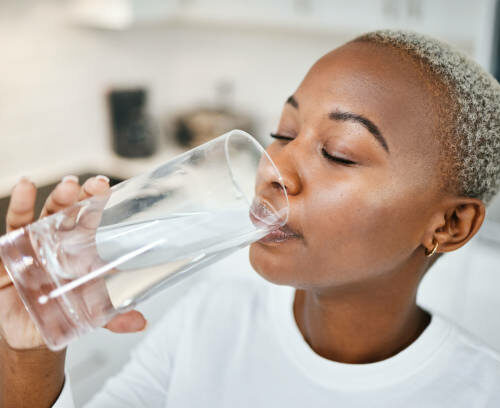
Water makes up between 50% and 70% of your body weight and is the primary chemical in your body. Water is essential for your body to survive.
Your body’s organs, cells, and tissues all require water to function properly. For instance, water
- Eliminates waste via urinating, sweating, and bowel motions.
- Regulates your body’s temperature
- Lubricates and cushions joints
- Protects sensitive tissues
According to Mayo Clinic lack of water leads to dehydration, a condition that happens when your body doesn’t have enough water to perform regular processes. Dehydration, even mild dehydration, can wear you out and sap your energy.
You lose water every day in your breath, sweat, urine, and bowel motions. You must refill your body’s water supply by ingesting liquids and meals that contain water in order for it to function correctly. The health publication states.
According to the U.S. National Academies of Sciences, Engineering, and Medicine, the following amounts of liquids should be consumed each day:
Men need about 15.5 cups (3.7 litres) of hydration every day.
Women should drink about 11.5 cups (2.7 litres) of fluid each day.
These suggestions include fluids from food, beverages, and water. Typically, food accounts for around 20% of daily fluid intake and beverages for the remaining 80%.
Therefore, all the body’s cells need water to function well. However, the issue arises when you drink too much water, which is called overhydration.
According to WebMD when you drink too much water you may experience water poisoning, intoxication, or a disruption of brain function. The cells, including brain cells, enlarge as a result of having too much water inside of them. Pressure in the brain is caused by the brain’s cells swelling. Confusion, fatigue, and headaches can start to bother you.
Confusion, tiredness, and headaches could start to bother you. If this pressure rises, it may result in disorders like bradycardia (low heart rate) and hypertension (high blood pressure), notes WebMD.
The electrolyte most impacted by excessive hydration is sodium, which can result in hyponatremia. A vital component that maintains the proper flow of fluids into and out of cells is sodium. Fluids enter cells when their levels fall as a result of the body’s high-water content. When the cells swell, you run the danger of developing convulsions, falling unconscious, or even dying WebMD furthered stated.
How do I know if I’m drinking enough?
Your fluid intake is probably adequate if:
- You rarely feel thirsty
- Your urine is colorless or light yellow
Make water your preferred beverage to avoid dehydration and to ensure that your body receives the fluids it requires. Drinking some water is a smart idea both before and after each meal.
You can get assistance from your doctor or nutritionist in figuring out how much water you should drink each day.
Also see: The pros and cons of exercising barefoot




